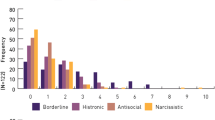Abstract
Aim
Previous studies have reported detrimental effects of maternal depression on infant care but have not taken into account the potential confounding effects of co-morbid personality disorder. We aimed to examine the independent effects of maternal depression and personality disorder on infant care.
Method
Assessments with 200 mothers who had a diagnosis of depression, personality disorder, both conditions, or neither condition, when their infants were aged 2 months, included structured clinical interviews, an interview about infant care practices, and standardised measures of quality of the home environment, maternal involvement with the baby, maternal sensitivity and infant irritability.
Results
The presence of depression and personality disorder had significant independent detrimental effects on infant care practices and maternal involvement with the baby, while depression alone had a negative effect on quality of the home environment.
Conclusion
Women with depression are less likely to use recommended infant care practices only when they also meet criteria for co-morbid personality disorder. Professionals working with women and babies need to consider the particular difficulties that mothers with both personality disorder and depression may have in providing satisfactory infant care.
Similar content being viewed by others
References
Abela JR, Skitch SA, Auerbach RP, Adams P (2005) The impact of parental borderline personality disorder on vulnerability to depression in children of affectively ill parents. J Personal Disord 19:68–83
American Psychiatric Association (2000) Diagnostic and statistical manual of mental disorders, 4th edn, text revision. American Psychiatric Association, Washington DC
Brazelton TB, Nugent JK (1995) Neonatal behavioural assessment scale, 3rd edn. Mac Keith, Cambridge
Caldwell BM, Bradley RH (1984) Home observation for measurement of the environment. University of Arkansas, Little Rock
Campbell SB, Cohn JF, Meyers T (1995) Depression in first-time mothers: mother–infant interaction and depression chronicity. Dev Psychol 31:349–357
Cassidy B, Zoccolillo M, Hughes S (1996) Psychopathology in adolescent mothers and its effects on mother-infant interactions: a pilot study. Can J Psychiatry 41:379–384
Coid J, Tyrer P, Roberts A, Ullrich S (2006) Prevalence and correlates of personality disorder in Great Britain. Br J Psychiatry 188:423–431
Conroy S, Marks MN (2003) Maternal psychological vulnerability and early infant care in a sample of materially disadvantaged women. J Reprod Infant Psychol 21:5–22
Crandell LE, Patrick MPH, Hobson RP (2003) Still-face interactions between mothers with borderline personality disorder and their 2-month-old infants. Br J Psychiatry 183:239–247
Crittenden P (2001) CARE-Index coding manual. Family Relations Institute, USA
Danon G, Rosenblum C, Heroux D, Tarnopolski D, Annick L (2001) Maternal borderline personality disorder, motherhood and mother-infant interactions. Arch Womens Ment Health 3:4–5
DeMulder EK, Tarull LB, Klimes-Dougan B, Free K, Radke-Yarrow M (1995) Personality disorders of affectively ill mothers: links to maternal behaviour. J Personal Disord 9:199–212
Department of Health (2004) Reduce the risk of cot death. Department of Health, London
Ertem IO, Forsyth BWC, Avni-Singer AJ, Damour LK, Cicchetti DV (1996) Development of a supplement to the HOME scale for children living in impoverished urban environments. J Dev Behav Pediatr 18:322–328
Farran D, Kasari C, Comfort M, Jay S (1986) Parent/caregiver involvement scale. Vanderbilt University, Nashville
Field TF (2002) Early interactions between infants and their postpartum depressed mothers. Infant Behav Dev 7:517–522
First MB, Spitzer RL, Gibbon M, Williams JBW, Smith Benjamin L (1997) Structured Clinical Interview for DSM-IV Personality Disorders (SCID-II). American Psychiatric Press, Washington DC
First MB, Spitzer RL, Gibbon M, Williams JBW (1997) Structured Clinical Interview for DSM-IV Axis I Disorders, Research Version, Non-patient Edition. (SCID-I/NP) Biometrics Research, New York
Gavin NI, Gaynes BN, Lohr KN, Meltzer-Brody S, Gartlehner G, Swinson T (2005) Perinatal depression: a systematic review of prevalence and incidence. Obstet Gynecol 106:1071–1083
Hirschfeld RM (1999) Personality disorders and depression: comorbidity. Depress Anxiety 10:142–146
Johnson JG, Cohen P, Kasen S, Ehrensaft MK, Crawford TN (2006) Associations of parental personality disorders and Axis I disorders with childrearing behaviour. Psychiatry 69:336–350
Kim-Cohen J, Moffit TE, Taylor A et al (2005) Maternal depression and children’s antisocial behaviour. Arch Gen Psychiatry 62:173–181
Kroenke K, Spitzer RL, Williams JB (2001) The PHQ-9: validity of a brief depression severity measure. J Gen Intern Med 16:606–613
Moran P, Leese M, Lee T, Walters P, Thornicroft G, Mann A (2003) Standardised Assessment of Personality-Abbreviated Scale (SAPAS): preliminary validation of a brief screen for personality disorder. Br J Psychiatry 183:228–232
Mulder RT (2002) Personality pathology and treatment outcome in major depression: a review. Am J Psychiatry 159:359–371
Murray L, Fiori-Cowley A, Hooper R (1996) The impact of postnatal depression and associated adversity on early mother-infant interactions and later infant outcome. Child Dev 67:2512–2526
Murray L, Cooper P, Creswell C, Schofield E, Sack C (2007) The effects of maternal social phobia on mother-infant interactions and infant social responsiveness. J Child Psychol Psychiatry 48:45–52
Newman LK, Stevenson CS, Bergman LR, Boyce P (2007) Borderline personality disorder, mother-infant interaction and parenting perceptions: preliminary findings. Aust N Z J Psychiatry 41:598–605
Acknowledgments
The study was funded by the Foundation for the Study of Infant Deaths, with some additional funding from the Psychiatry Research Trust. We are grateful to the women who took part in the study and to Liz Hicks and the staff at Kings College Hospital for facilitating the recruitment of participants. We also thank Laura Jones for her assistance with recruitment and screening.
Author information
Authors and Affiliations
Corresponding author
Rights and permissions
About this article
Cite this article
Conroy, S., Marks, M.N., Schacht, R. et al. The impact of maternal depression and personality disorder on early infant care. Soc Psychiat Epidemiol 45, 285–292 (2010). https://doi.org/10.1007/s00127-009-0070-0
Received:
Accepted:
Published:
Issue Date:
DOI: https://doi.org/10.1007/s00127-009-0070-0




